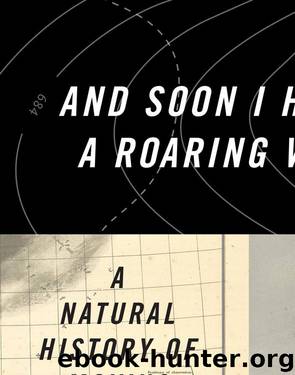And Soon I Heard a Roaring Wind by Bill Streever

Author:Bill Streever
Language: eng
Format: epub
Publisher: Little, Brown and Company
Published: 2016-07-26T04:00:00+00:00
Among sailors, frigate birds are sometimes said to come just before bad weather. More analytical sailors might say that they ride the leading edges of fronts. In contrast, Robert FitzRoy wrote, “When seabirds fly out early, and far to seaward, moderate wind and fair weather may be expected.” To him, seabirds flying inland are harbingers of a storm. But he might have been thinking of seabirds other than frigates.
FitzRoy believed that many animals have some sense of the coming weather. “As many creatures besides birds,” he wrote, “are affected by the approach of rain or wind, such indications should not be slighted by an observer who wishes to foresee weather.”
FitzRoy was not the first to notice that animals seem to sense coming weather. From Horace, nineteen centuries before FitzRoy: “I will by prayer, from sunrise, arouse the croaking raven before the bird that foretells approaching rain revisits the standing pools.” And from Pliny the Elder, eighteen centuries before FitzRoy: “When land-birds, especially crows, wash themselves, and are noisy near pools of water, it is a sign of rain.”
Croaking frogs predict storms. Cows lie down before it rains, shielding a dry piece of land, avoiding the necessity of bedding down in a puddle. Watch the bees and butterflies, too. If sheep huddle together, expect a cold front. If ladybugs swarm, expect heat. And somehow groundhogs notice their shadows only in years of long winters.
In 1863, the year of FitzRoy’s Weather Book, a Dutchman published another book that included meteorological signs. Like FitzRoy, the author wrote of animal predictions, dwelling for a moment on the story of a French spy in Utrecht who predicted a severe winter based on the movements of a spider. The French were hoping to invade the Netherlands, but they were stymied by rivers and soft bogs, conditions that would slow horses and foot soldiers alike. Hearing the spider-based forecast from their spy, seeing an opportunity in the impending cold weather, the French crossed frozen rivers in 1795 and moved swiftly across the frost-hardened land.
The Dutch author believed in animal forecasts, but not as much as he believed in science. “Let it not be supposed,” he wrote, “that we would deny that many animals should not be possessed of a peculiar sensibility which enables them to appreciate future changes of the state of the weather; but their aptitude for this peculiarity is rather limited, and our meteorological instruments inform us more rapidly and surely of any changes of the weather.”
Download
This site does not store any files on its server. We only index and link to content provided by other sites. Please contact the content providers to delete copyright contents if any and email us, we'll remove relevant links or contents immediately.
Man-made Catastrophes and Risk Information Concealment by Dmitry Chernov & Didier Sornette(6011)
The Revenge of Geography: What the Map Tells Us About Coming Conflicts and the Battle Against Fate by Kaplan Robert D(4076)
Zero Waste Home by Bea Johnson(3835)
COSMOS by Carl Sagan(3618)
Good by S. Walden(3549)
In a Sunburned Country by Bill Bryson(3537)
The Fate of Rome: Climate, Disease, and the End of an Empire (The Princeton History of the Ancient World) by Kyle Harper(3062)
A Wilder Time by William E. Glassley(2859)
Camino Island by John Grisham(2797)
Organic Mushroom Farming and Mycoremediation by Tradd Cotter(2689)
The Ogre by Doug Scott(2679)
Human Dynamics Research in Smart and Connected Communities by Shih-Lung Shaw & Daniel Sui(2500)
Energy Myths and Realities by Vaclav Smil(2489)
The Traveler's Gift by Andy Andrews(2460)
9781803241661-PYTHON FOR ARCGIS PRO by Unknown(2365)
Inside the Middle East by Avi Melamed(2352)
Birds of New Guinea by Pratt Thane K.; Beehler Bruce M.; Anderton John C(2254)
A History of Warfare by John Keegan(2240)
And the Band Played On by Randy Shilts(2201)
